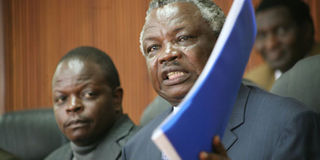Why Kenya is still in colonialists’ grip, 50 years after independence

Central Organisation of Trade Unions chairman Francis Atwoli during a media briefing on April 19, 2011 where he said the union was in negotiations with the government to increase the minimum wage and salaries for workers. The lowest paid cadre in government receives the minimum wage of about Sh13,000 and the highest paid gets more than Sh2.5 million per month. PHOTO| HEZRON NJOROGE| NATION MEDIA GROUP
What you need to know:
- But at that time, there was an armed insurgency going on unlike in 2013 when four people caused terror that was then blamed on an entire community
- And how about the ethnic divide and rule? Where some communities are favoured over others for supporting those in power— just like the settlers were favoured, together with home-guards and those supporting the colonial system?
- And he essentially put the country and the world on notice, stating that as long as terrorism continues “Kenya… will find it difficult to entrench democracy and the post-2015 development agenda.”
I never cease to be amazed at how colonial the attitudes of our political leadership remain.
Yes, we are 50 years into independence, and four years into our new liberating Constitution, but still the style, the systems, and the thinking remain as colonial as it was during the 70 years of British rule. We simply changed white skins for black ones.
For instance, the response to the terrorist attack on Westgate was straight out of the colonial emergency playbook: Stigmatise an entire community; round them up willy-nilly; create concentration camps specifically for them; and then lie to us that an independent commission of inquiry will be set up.
This is exactly what the colonial rulers did in 1952 with the Mau Mau insurgency.
ARMED INSURGENCY
But at that time, there was an armed insurgency going on unlike in 2013 when four people caused terror that was then blamed on an entire community.
The results of this response? Anger, marginalisation, and possible hardening of attitudes. Just like in 1952.
Then there is the uneven development where pastoralists are left to their own devices.
So much so that the police don’t even send adequate officers to the regions, preferring instead to arm the different local populations so that they take care of their own security, which results in predictable skirmishes every so often. Another page from the colonial playbook!
And how about the ethnic divide and rule? Where some communities are favoured over others for supporting those in power— just like the settlers were favoured, together with home-guards and those supporting the colonial system?
WAGE DIFFERENCE
And how else can we understand the massive gap in public “service” salaries unless through the colonial prism? The lowest paid cadre in government receives the minimum wage of about Sh13,000.
The highest paid gets more than Sh2.5 million per month, excluding “buttock” and other such allowances. It is the colonial system where mzungu civil servants were paid more than they were worth, while the “sub-human” Africans had to survive on their wits.
And just this week at the UN in New York, Uhuru Kenyatta effectively blamed the hard fought democratic space— for which he played no part, but has been one of its most significant beneficiaries— for the state’s incompetence in dealing with terrorism!
And he essentially put the country and the world on notice, stating that as long as terrorism continues “Kenya… will find it difficult to entrench democracy and the post-2015 development agenda.”
Maybe it is just his speech writers and advisers who crafted such a threatening statement, but then again, the trend since last year has been efforts by those in power to reduce the democratic space.
DICTATORIAL RULE
This is a false but dangerous choice being articulated: That the only way to combat terrorism is to curtail hard fought freedoms. Yet, harsh and ill-thought out strategies always boomerang creating more dangers and troubles ahead.
A strategy that respects the rule of law, is based on the hard work by intelligence and security services, and respects human rights always wins. Norway’s recent experiences affirm that.
Imposing dictatorial rule may seem attractive in the short term, as extra-judicial killings increase, criticism is muted and a culture of silence and fear ensues.
But it always backfires, promoting state sanctioned corruption and theft, as well as eliminating or curtailing voices of reason.
The worst thing about this blind acceptance of colonial attitudes and methods is that they insult us all deeply.
They assume that we, the ordinary people, are stupid and sub-human who can only understand brute force.
And yet, unlike 1963 when our leadership was not so exposed, today’s “leaders” have benefited from exposure to different sorts of thinking like none before, even if only through the internet.
But somehow they still cling to the old outdated methods. The colonialists must be smiling in their graves.





